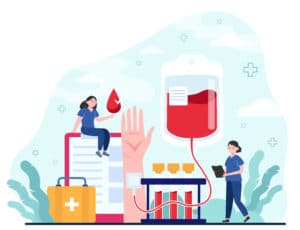
Type O negative blood is considered the universal blood type since it can be used for most recipients with a minimal risk of infection, making it beneficial in trauma situations where the time to crossmatch blood types is unavailable. However, due to factors such as the Covid-19 pandemic limiting donation opportunities and an increase in demand from Trauma Centers, all blood types including type O negative are in extremely short supply. The Red Cross announced that it is currently experiencing a “severe blood shortage.” Vitalant, one of the nation’s oldest and largest nonprofit transfusion medicine organizations, said its blood supply is half of what it should be and is critically short for needed medical procedures across the country.
An insufficient blood supply can have a devastating effect on hospitals, which could struggle to properly treat trauma patients, provide blood transfusions, and conduct elective surgeries that have been on pause due to the pandemic. Also, the Covid-19 pandemic has limited blood donation opportunities like blood drives and has also caused a sense of hesitancy among donors according to donation centers. But, according to Vitalant and the Red Cross, it is not possible to spread or contract Covid-19 through donating or receiving blood, nor is a person required to be vaccinated against Covid-19 to donate blood.
Regardless of the reasons, hospital blood banks are currently experiencing a shortage of blood that may become a full-blown crisis. Most Trauma Centers or Emergency Departments in hospitals have a blood bank to store blood for emergent situations. Tracking, controlling and documenting blood use in Emergency Departments and Trauma Centers is extremely difficult considering the hectic nature of the procedures performed there. One major obstacle to proper blood tracking is that most hospitals use manual, paper forms that pass through several hands during an emergency case. Because Trauma Centers typically use universal donor blood without crossmatching, they don’t always pay close enough attention to the documentation. This lack of documentation can lead to devastating results, including a shortage of blood supply because re-orders are not being placed due to lack of communication.
After being approached by a leading academic medical center in the Northeast, Mobile Aspects has come up with a solution to tackle these unique challenges. iRISecure Blood is the first and only RFID (radio frequency identification) blood tracking system designed specifically for Trauma Centers and Emergency Departments. It can track and document blood from the receipt at the hospital’s blood bank to the final transfusion to patient in the Trauma Center and everywhere in between. The system also tracks the time of receipt of blood into the blood bank, blood type, storage location, users, and can track when removed for transport to the Emergency Room or Trauma Center. The system can also be integrated with the blood supplier’s information system to provide seamless communication between a blood bank and its blood supplier, as well as to the Electronic Medical Record to provide automatic documentation in the patient’s medical record.
Sign up for a demo today.
